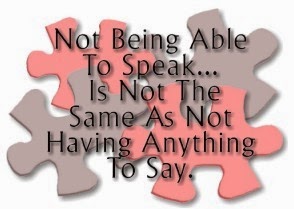I met some people on the autism spectrum on Twitter last
year. They spoke for themselves, about the disorder, the struggles and the
blessing of autism. I visited their blogs and learnt more about them and their
autism experiences.
That day I got to a client’s house, and looking at him I
wished he could speak for himself. I wish he could talk about his struggles,
his victories, his needs, and much more. But I realized that his mum has been
speaking for him, actually both parents but I have had cause to interact with
his mum more. By interacting with her, I have learnt a lot about him, how far
he has come, and I have learnt to appreciate his journey.
If parents don’t speak up for their children on the spectrum,
how can people understand? It’s important to get early intervention, therapy,
SEN support for your child, but beyond that be the VOICE for your child.
 |
| This caption captures my thoughts |
A mother told me that sometime ago, she went to her child’s
school to lecture the teachers on anxiety and sensory processing disorder in
children with autism, helping them understand some of the challenges that her
child has to deal with daily. She said that it changed the teacher’s
disposition towards her child, and she noticed progress in her child’s
learning.
What if she never spoke up for her child?
Another advantage of speaking out for your child is that you
may be speaking up for another child, you may be giving hope to another parent.
Sometimes all a mother needs is the assurance that she is not alone, and you
will be giving her hope by speaking up.
Today, April ends. But does autism awareness end? It doesn’t.
Autism awareness continues. Autism advocacy continues. We will continue to be
the voice that speaks for children, adolescents, and adults that live with autism.
We will continue to speak for their families.
 |
| I speak for children that I teach |
I want to appreciate those who have supported the blog by
sharing the articles throughout the month. I want to encourage you to continue
sharing, not just articles from this blog, but also other articles on autism.
Let us be the voice of those who cannot speak for themselves. People with
autism have the RIGHT TO HAVE A VOICE.









































